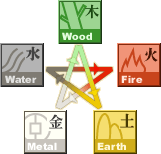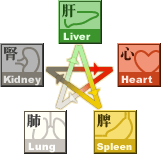The Chinese Way of Mind Cultivation
A sound mental state ensures that the physical body is under proper control and the organ systems are working in harmony, so the body can protect itself effectively against disease. In comparison with the old days, modern life makes a higher demand on us in terms of mental functioning. The fast pace of life, extreme competitiveness of business, and 24-hour communication as well as limited living space always make us over-alert and stressed.
Mental activities include feeling, memory, thought, consciousness, emotion, sentiment, desires etc, which TCM generally refers as Shen (spirit). In TCM theory, the heart is the residence of the shen (spirit); the heart's blood and qi are important material sources for mental and emotional activities. Only when the heart's qi and blood are abundant can the shen be properly nourished, mental activities be carried out normally, making the individual fully alert and responsive to external stimulation. TCM advocates that we look after our mental condition by maintaining a calm and peaceful mind, avoiding excess emotional frustration, enjoying hobbies, and invigorating the heart as well as the physical body.
An optimistic attitude toward life helps to establish a peaceful and carefree mind. One should foster a positive view on the personal ups and downs of life; take responsibility for our own actions and choices; try to avoid over-stimulating our senses; get rid of improper desires; and try to be "in the moment" by concentrating on your current activity.
A regular and balanced lifestyle is essential for both physical and mental well-being. Nourishing the heart in daily life is important for obvious reasons. It ensures vitality and a long life. Some foods that benefit the heart include lily bulbs, oriental arborvitae seed, white fungus, longan fruit, lotus seed, lotus root, beef, beer, wheat, red dates, wild jujube and rose buds (often used to make tea). Certain static Qigong exercises can also bring about deep relaxation.
More importantly, one should properly control one's emotional reactions by reacting moderately and solving conflicts as soon as possible. Emotions are responses to external stimuli that involve physiological changes to the body. TCM regards them as the manifestations of the physiological functions in the organs. That means the essence and qi (vital energy) of the organs constitute the material basis for emotional activities. From long-term observation, physicians state that anger, anxiety, fear, grief, extreme elation, over-thinking and terror are the most seen mental disturbances of people. These particular emotions are known as the "seven emotions" in TCM. Within normal limits, these emotions cause no harm. However, when they become uncontrollable and overwhelming they can damage specific organs.
It is said that anger impairs the liver, extreme elation impairs the heart, grief and anxiety impair the lung, and over-thinking impairs the spleen, while fright and terror impairs the kidney. Extreme and prolonged emotional frustrations especially disturb the qi (vital energy) flows. The disorders are as follows.
 |
 |
| Mutual restriction cycle of the five elements. |
 |
Anger makes the liver-qi rush up, which brings the blood upward; an individual will exhibit dizziness, distention and heaviness in the head, and weakness in the lower limbs. |
 |
Extreme elation makes the heart-qi scattered; an individual will have difficulty in concentrating, be absent-minded, disorientated, and perhaps even exhibit mania in severe cases. |
 |
Grief and anxiety consumes the lung-qi; an individual will appear in low spirits, have difficulty in breathing and experience lassitude. |
 |
Over-thinking makes the spleen-qi stagnate; an individual exhibits fatigue, poor appetite, gastric discomfort, belching and reflux. |
 |
Terror and fright makes the kidney-qi decline and induces a disturbance of the general qi flow; an individual will experience panic, heart palpitations and restlessness. They may also have sudden urinary or fecal incontinence. |
Based on the five elements theory and the idea of emotions corresponding to the organs, TCM has created concrete guidelines for clinical applications. The seven emotions are related to each other and so can be employed to restrain harmful emotional reactions.
The suggested methods listed below are just some examples for considerations.
| Elements |
Associated organs |
Related emotions |
Abnormal behaviors |
Counteracting emotions |
Suggested methods |
| Wood |
Liver |
Anger |
Irritability, yelling acting violently |
Grief or anxiety |
Use sad news to calm and cool down the anger |
| Fire |
Heart |
Extreme elation |
A frenzied delight for no reason, acting queerly |
Terror or fright |
Scare or use something frightening to depress the excited mood |
| Earth |
Spleen |
Over-thinking |
Over concentration, stressful, low spirit, dull |
Anger |
Use insulting and rude language to enrage |
| Metal |
Lungs |
Grief and anxiety |
Constant sadness, |
Delight |
Use pleasant conversation and physical contact to cheer the person up |
| Water |
Kidneys |
Terror and fright |
Timid, panic, loss of concentration |
over-thinking |
Discuss the problem with another to induce deeper understanding |
It should be noted that human emotions are complicated and cannot be evaluated simply; a comprehensive analysis of the individual situation is necessary. Many of the great TCM physicians have fully utilized the above techniques to cure both psychological and physical conditions.
TCM also encourages people to pursue personal hobbies and crafts, such as playing music, chess, calligraphy or drawing. When you are engaged in a favorite activity, your mind can be distracted from the stresses of everyday life.
|